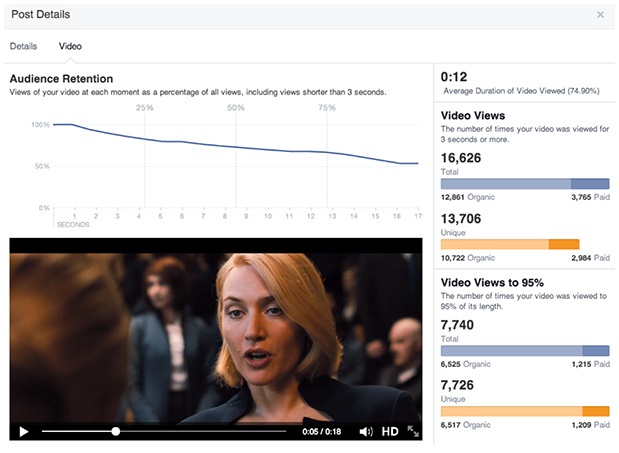Facebook has admitted that it overestimated the time people spend watching videos on the social network for the last two years, a revelation that could have big implications for advertisers.

The error affected a Facebook metric called “average duration of video viewed”, which was supposed to tell publishers for how long, on average, people had watched a video.
In a blog post on its official site, the social network said Facebook said that its measure of the average time users spent watching videos was artificially inflated because it was only factoring in video views of more than three seconds – resulting in data that overestimated this metric by 60-80%.
However, the metric did not include viewers who had watched for less than three seconds in the count.
The social network said the error had been fixed and had not changed how much advertisers paid the site.
The move means that the social netowrk potentially misguided advertisers who spent money promoting campaigns on the social network. Facebook’s analytics are an important tool for advertisers, who use them to work out how much of their video content is being watched.
Facebook acknowledged the error in a statement:
“We recently discovered an error in the way we calculate one of our video metrics. This error has been fixed, it did not impact billing, and we have notified our partners both through our product dashboards and via sales and publisher outreach. We also renamed the metric to make it clearer what we measure. This metric is one of many our partners use to assess their video campaigns.”
The company is introducing a new metric called “Average Watch Time”, which will reflect video views of any duration (and not just those that go longer than three seconds).
Industry reaction- need for third party verification?
The announcement has raised questions about whether external companies should be brought in to measure analytics for advertisers.
Its clients are obviously not too pleased. Ad group Publicis, which purchased $77 billion worth of ads last year, noted: “This once again illuminates the absolute need to have 3rd party tagging and verification on Facebook’s platform”.
“Seeing the Facebook news about overestimating video views for 2 years makes me wonder about Snapchat,” Shafqat Islam, co-founder of NewsCred wrote on Twitter. “Need 3rd party verification everywhere.”
Seeing the Facebook news about overestimating video views for 2 years makes me wonder about Snapchat. Need 3rd party verification everywhere
— Shafqat Islam (@shafqatislam) September 23, 2016
However, some marketers said the video metrics scandal was overblown.
Speaking to the Wall Street Journal, Jason Stein, founder and CEO of 250-employee social marketing agency Laundry Service, said: “The issue is being hugely overblown. Marketers do not care about it, and it has zero impact on spend.”
Speaking to TechCrunch, analytics provider Parse.ly CTO Andrew Montalenti said: “I think the metric measurement problem that the WSJ printed about was a honest mistake on Facebook’s side. If someone didn’t watch for at least three seconds, it’s an accidental view and shouldn’t be counted.”
Formal apology
Facebook has issued a formal apology for the screw-up with a follow-up statement by David Fischer, VP of business and marketing partnerships:
“…But this isn’t just about this error. This is about how seriously we take our partners’ commitment to our platform, and how their investments with us wholly depend on the transparency with which we communicate. We know we can’t have true partnerships with our clients unless we are upfront and honest with them, including when we make mistakes like this one. Our clients’ trust and belief in our metrics is essential to us and we have to earn that trust. That is why we also give marketers choice by offering third-party video verification options with companies like Nielsen and Moat. We want marketers to measure video with us in the way they feel most comfortable.
“We sincerely apologize for the issues this has created for our clients. This error should not stand in the way of our ultimate goal, which is to do what’s in the best interest of our partners and their business growth. We can only be successful if we’re providing clients with the tools to drive their business forward, and we’ll continue to deliver on that promise.”
